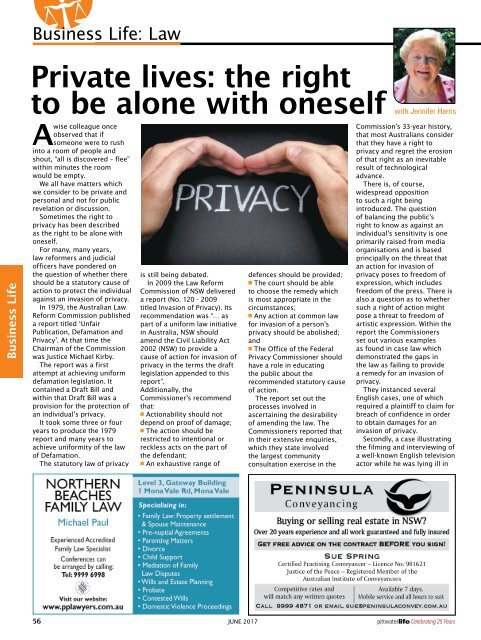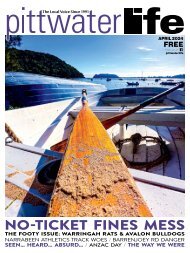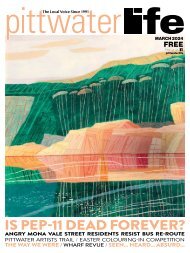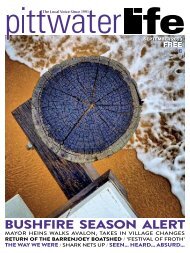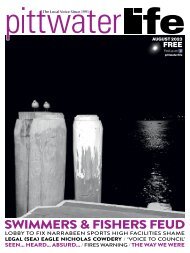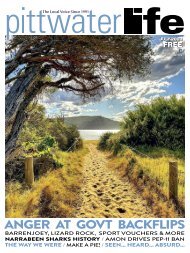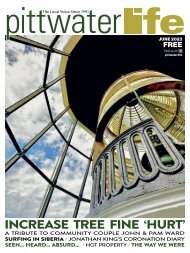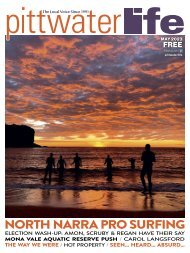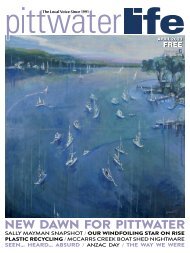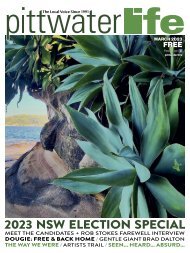Pittwater Life June 2017 Issue
Cafe Society. Exclusive Q&A: Michael Regan. Dummies Guide To The B-Line. Cash Splash.
Cafe Society. Exclusive Q&A: Michael Regan. Dummies Guide To The B-Line. Cash Splash.
Create successful ePaper yourself
Turn your PDF publications into a flip-book with our unique Google optimized e-Paper software.
Business <strong>Life</strong>: Law<br />
Business <strong>Life</strong><br />
Private lives: the right<br />
to be alone with oneself<br />
A<br />
wise colleague once<br />
observed that if<br />
someone were to rush<br />
into a room of people and<br />
shout, “all is discovered – flee”<br />
within minutes the room<br />
would be empty.<br />
We all have matters which<br />
we consider to be private and<br />
personal and not for public<br />
revelation or discussion.<br />
Sometimes the right to<br />
privacy has been described<br />
as the right to be alone with<br />
oneself.<br />
For many, many years,<br />
law reformers and judicial<br />
officers have pondered on<br />
the question of whether there<br />
should be a statutory cause of<br />
action to protect the individual<br />
against an invasion of privacy.<br />
In 1979, the Australian Law<br />
Reform Commission published<br />
a report titled ‘Unfair<br />
Publication, Defamation and<br />
Privacy’. At that time the<br />
Chairman of the Commission<br />
was Justice Michael Kirby.<br />
The report was a first<br />
attempt at achieving uniform<br />
defamation legislation. It<br />
contained a Draft Bill and<br />
within that Draft Bill was a<br />
provision for the protection of<br />
an individual’s privacy.<br />
It took some three or four<br />
years to produce the 1979<br />
report and many years to<br />
achieve uniformity of the law<br />
of Defamation.<br />
The statutory law of privacy<br />
is still being debated.<br />
In 2009 the Law Reform<br />
Commission of NSW delivered<br />
a report (No. 120 - 2009<br />
titled Invasion of Privacy). Its<br />
recommendation was “… as<br />
part of a uniform law initiative<br />
in Australia, NSW should<br />
amend the Civil Liability Act<br />
2002 (NSW) to provide a<br />
cause of action for invasion of<br />
privacy in the terms the draft<br />
legislation appended to this<br />
report”.<br />
Additionally, the<br />
Commissioner’s recommend<br />
that:<br />
n Actionability should not<br />
depend on proof of damage;<br />
n The action should be<br />
restricted to intentional or<br />
reckless acts on the part of<br />
the defendant;<br />
n An exhaustive range of<br />
defences should be provided;<br />
n The court should be able<br />
to choose the remedy which<br />
is most appropriate in the<br />
circumstances;<br />
n Any action at common law<br />
for invasion of a person’s<br />
privacy should be abolished;<br />
and<br />
n The Office of the Federal<br />
Privacy Commissioner should<br />
have a role in educating<br />
the public about the<br />
recommended statutory cause<br />
of action.<br />
The report set out the<br />
processes involved in<br />
ascertaining the desirability<br />
of amending the law. The<br />
Commissioners reported that<br />
in their extensive enquiries,<br />
which they state involved<br />
the largest community<br />
consultation exercise in the<br />
with Jennifer Harris<br />
Commission’s 33-year history,<br />
that most Australians consider<br />
that they have a right to<br />
privacy and regret the erosion<br />
of that right as an inevitable<br />
result of technological<br />
advance.<br />
There is, of course,<br />
widespread opposition<br />
to such a right being<br />
introduced. The question<br />
of balancing the public’s<br />
right to know as against an<br />
individual’s sensitivity is one<br />
primarily raised from media<br />
organisations and is based<br />
principally on the threat that<br />
an action for invasion of<br />
privacy poses to freedom of<br />
expression, which includes<br />
freedom of the press. There is<br />
also a question as to whether<br />
such a right of action might<br />
pose a threat to freedom of<br />
artistic expression. Within the<br />
report the Commissioners<br />
set out various examples<br />
as found in case law which<br />
demonstrated the gaps in<br />
the law as failing to provide<br />
a remedy for an invasion of<br />
privacy.<br />
They instanced several<br />
English cases, one of which<br />
required a plaintiff to claim for<br />
breach of confidence in order<br />
to obtain damages for an<br />
invasion of privacy.<br />
Secondly, a case illustrating<br />
the filming and interviewing of<br />
a well-known English television<br />
actor while he was lying ill in<br />
56 JUNE <strong>2017</strong><br />
Celebrating 25 Years


